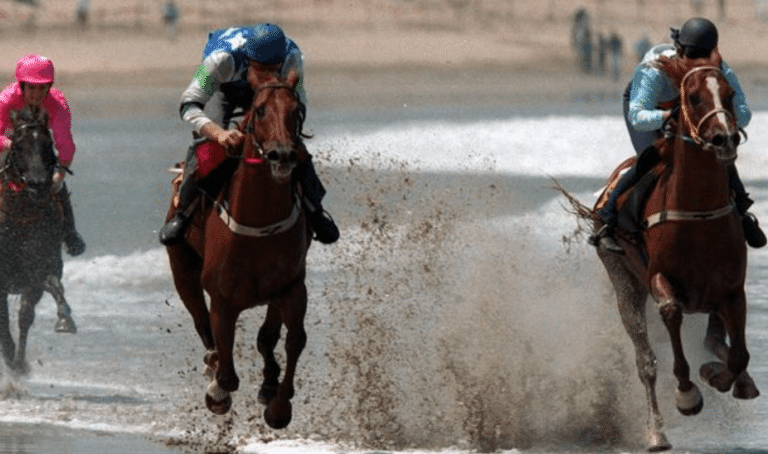Horse racing is often called the sport of kings, but it is also a sport of nature. While training, breeding, and jockey skill all contribute to success on the track, weather conditions can play a decisive role in shaping the outcome of a race. From blazing sun to pouring rain, the elements affect not only the horses but also the track itself, changing the dynamics of competition in subtle and dramatic ways.
In this article, we’ll explore how different weather conditions impact horse racing performance and why understanding these factors is crucial for trainers, jockeys, and even bettors.
1. Temperature: Hot vs. Cold
Hot Weather
- Effects on Horses: High heat can lead to fatigue, dehydration, and slower recovery times. Horses may also sweat excessively, losing electrolytes that are vital for muscle performance.
- Impact on Racing: Some horses thrive in warm climates, while others may struggle. Heat often results in slower race times overall.
- Precautions: Trainers ensure horses are well-hydrated and sometimes adjust training schedules to early mornings or evenings when it’s cooler.
Cold Weather
- Effects on Horses: Cold conditions can tighten muscles and make horses less flexible, increasing the risk of strains.
- Impact on Racing: Cold weather often favors horses with higher stamina, as they don’t overheat as easily.
- Precautions: Extra warm-up exercises are crucial to keep horses supple before a race.
2. Rain and Wet Conditions
Rain is one of the most significant weather factors in horse racing because it alters the track surface dramatically.
- Soft/Heavy Ground: Rain can turn turf tracks into soft or muddy surfaces, requiring greater stamina and strength. Horses with powerful hindquarters and proven ability on heavy ground often excel.
- Sloppy Dirt Tracks: On dirt, rain can create a slick, sloppy surface. Some horses handle it well, while others lose traction and struggle.
- Visibility and Safety: Rain can also impair jockeys’ visibility and affect horses that dislike mud splashing in their faces.
See also: How to Spot a Potential Champion Horse
3. Wind Conditions
Wind is often overlooked but can have a subtle impact on race dynamics.
- Headwinds: Slow horses down, especially front-runners who face the brunt of the resistance.
- Tailwinds: Help sprinters and can result in faster finishing times.
- Crosswinds: Can unsettle horses, particularly nervous or inexperienced ones.
Jockeys often adjust tactics, using other horses as “shields” to conserve energy in windy conditions.
4. Humidity and Air Quality
- High Humidity: Makes it harder for horses to cool down through sweating, increasing the risk of heat stress.
- Low Humidity: Can lead to dehydration more quickly if water intake is not carefully monitored.
- Air Quality: In rare cases, dust, smoke, or poor air conditions (such as from wildfires) can impact a horse’s breathing and performance.
5. Track Surfaces and Weather Interaction
Different tracks respond differently to weather:
- Turf (Grass): Most affected by rain, becoming soft or heavy. Horses bred in countries with wetter climates (like Ireland or the UK) often handle it better.
- Dirt: Can turn “fast” on dry days but become muddy and inconsistent when wet.
- Synthetic (All-Weather): Designed to reduce weather impact, but horses still show preferences for certain conditions.
6. Psychological Impact on Horses
Weather affects not just the body but also the mind of a horse.
- Some horses dislike the noise of heavy rain or thunder.
- Nervous horses may become unsettled in windy conditions.
- Others seem to thrive regardless of the elements, showing strong adaptability—a hallmark of champions.
7. The Bettor’s Angle
For fans and bettors, weather is an important factor to analyze:
- A horse proven on “soft ground” may gain an advantage in wet weather.
- A sprinter may shine with a tailwind, while a stamina horse may perform better in cooler conditions.
- Paying attention to track reports and past performances in similar conditions often separates casual bets from smart wagers.
Conclusion
Weather is an unpredictable but powerful force in horse racing. From scorching heat to muddy tracks, it shapes not only the physical performance of horses but also the tactics of jockeys and strategies of trainers. For bettors, understanding how weather impacts the race can be the difference between picking a winner and backing a horse unsuited to the conditions.
In the end, weather reminds us that horse racing is not just a contest of speed and stamina—it’s a sport where nature itself plays a decisive role.
